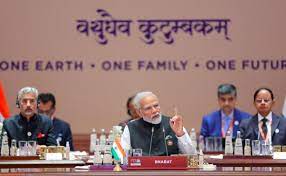Manas Dasgupta
NEW DELHI, Sept 9: War-torn Ukraine has expressed strong disappointment over the “Delhi declaration” of the G20 Summit that took over 200 hours of “non-sop negotiations” to arrive at unanimity criticising the Russian invasion and denounced the use of force for territorial gain but refrained from direct criticism of Russia by name.
The G20 meet has adopted the “New Delhi declaration,” seen as a huge win India, the current president of the group of nations. Reaching a consensus for international groupings has been difficult of late owing the war in Ukraine and divisions over tackling climate change.
“Ukraine is grateful to the partners who tried to include strong wording in the text. At the same time, in terms of Russia’s aggression against Ukraine, the Group of 20 has nothing to be proud of,” said Oleg Nikolenko, a spokesman at the Ukrainian Foreign Affairs Ministry. The document had said that “all states” should “refrain from the threat or use of force to seek territorial acquisition against the territorial integrity and sovereignty or political independence of any state.”
There was no explicit reference to Russia, unlike in a G-20 statement in Bali in 2022 that cited a U.N. resolution condemning “in the strongest terms the aggression by the Russian Federation against Ukraine.” “It’s obvious that the Ukraine’s participation (in the meeting) would allow the participants to better understand the situation,” Mr Nikolenko said. Ukraine, however, was not invited by India to attend the G20 Summit.
India’s Sherpa for the G20 Summit Amitabh Kant said the draft on which Ukraine has expressed its displeasure took nearly 200 hours of “nonstop negotiations” to ensure a joint communique from G20 leaders divided over the bloc’s stance on Russia’s war on Ukraine.
Mr Kant said the declaration was the result of multiple rounds of talks – from discussions with developing economies about the war’s economic impact to bilateral meets with Russia and China – and that consensus was only reached late on Friday night.
Mr Kant said the key was “working in partnership with sherpas” and that it was a joint effort of emerging markets – led by India, Brazil, South Africa and Indonesia, and later Mexico, Turkey and Saudi Arabia – that brought pressure to bear on G7 nations and brought them to the table.
“(There were) close to 200 hours of nonstop negotiations… the Bali paragraph had broken down and we were struggling for nine months. Then, in one meeting, I took a plain screen and scribbled 15 basic principles we needed to follow. All sherpas then joined in and gave their perspectives,” he explained.
“Based on this, we created a first draft… nobody really expected we would arrive at a consensus. The first draft triggered a number of reactions… people were pessimistic that we could ever arrive at a consensus on Russia and Ukraine because multilateral forums across the world had failed to do so.”
“From the first draft we went to a second… and a third. After that, I think what helped were bilateral meets with each country,” Mr Kant said. “Important thing was to draw each nation’s red lines.”
It was then India began working in partnership with three other sherpas – those from Brazil, Indonesia and South Africa. “So, it was a joint proposal of four emerging markets… and then we roped in Mexico, Turkey and Saudi Arabia. All of them joined hands and there was pressure from emerging markets.” “Our concern was that development issues are far more important than war issues… finally we negotiated with G7 countries, then Russia and China. Only last night we submitted the final draft,” he said.
The declaration also highlighted that the G20 will work to accelerate “strong, sustainable, balanced and inclusive growth” and work towards implementing the 2030 agenda for sustainable development. “We will ensure that no one is left behind. We commend the efforts of the Indian Presidency to accelerate the implementation of the 2030 agenda,” read the resolution adopted on Saturday.
It reaffirmed a rules-based, non-discriminatory, fair, open, inclusive, equitable, sustainable and transparent multilateral trading system. “We will support policies that enable trade and investment to serve as an engine of growth and prosperity for all,” the resolution read.
It also resolved to accelerate actions to address environmental crises and challenges including climate change. “We recognize that the impacts of climate change are being experienced worldwide, particularly by the poorest and the most vulnerable,” the resolution read.
“G20 will help developing nations access low-cost financing for existing and emerging clean and sustainable energy technologies and supporting the energy transitions. A climate finance has been set up so developed countries meet the $100 billion goal for a Collective Quantified Goal beyond 2025,” It said.

